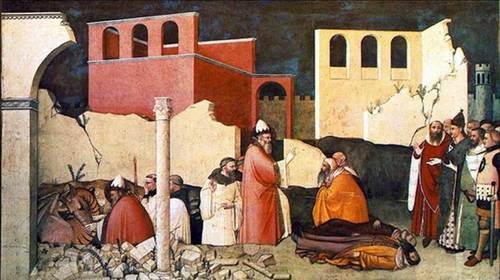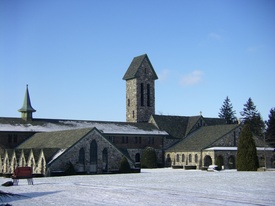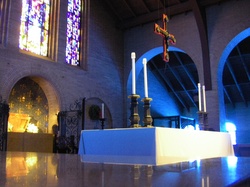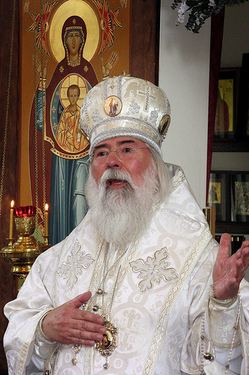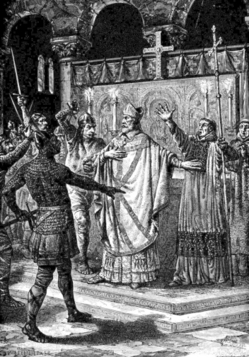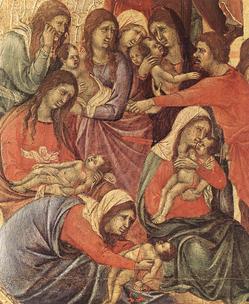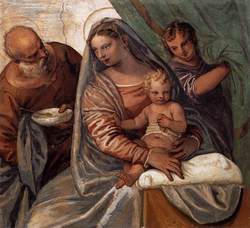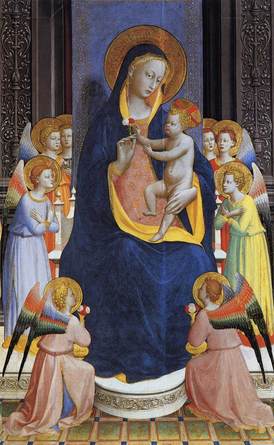
In Mary we praise that which places her above all others,
that is, fruitfulness of offspring together with virginity. For never has it
been known in this world that anyone was at the same time mother and virgin.
And see of Whom she is mother. Where does your astonishment at this so wondrous
dignity lead you? Is it not to this, that you may gaze in wonder yet never
sufficiently revere? Is she not in your veneration, no, in the esteem of Truth
itself, raised above choirs of angels? Does not Mary address the Lord and God
of all the angels as Son, saying: Son, why have you done so to us?
Who among the angels may thus presume? It is enough for
them, and for them their greatest honor, that while they are spirits by nature
they have become and are called angels, as David testifies: Who makes your
angels spirits. [Ps.103: 4] Mary, knowing herself a mother, with confidence
calls that Majesty Son Whom the angels in reverence serve. Nor does God disdain
to be called that which He disdained not to be. For the Evangelist adds a
little later: He was subject to them.
Who was subject to whom? A God to men.
God, I repeat, to Whom are the angels subject: Whom principalities and powers
obey: subject to Mary; and not alone to Mary, but to Joseph also, because
of Mary. Admire and revere both the one and the other, and choose which you
admire the more: the most sweet condescension of the Son, or the sublime
dignity of the Mother. For either am I at a loss for words: for both are
wondrous. For that God should obey a woman is humility without compare; and
that a woman should have rule over God dignity without equal. In praise of
virgins is it joyfully proclaimed: that they follow the lamb withersoever he
goes. [Rev. 14: 4] Of what praise shall you esteem her worthy who also goes
before Him?
Learn, O Man, to obey. Learn, O Earth, to be subject. Learn, O
Dust, to submit. The Evangelist in speaking of his Maker says: He was subject
to them; that is, without doubt, to Mary and to Joseph. Be you ashamed, vain
ashes that you are. God humbles Himself, and do you exalt yourself? God becomes
subject to men, and will you, eager to lord it over men, place yourself above
your Maker? O would that God might deign to make me, thinking such thoughts at
times in my own mind, such answer as He made, reproving him, to His apostle: Get behind me, Satan: because you savor not the things that are of God. [Mark 8:
33]
For as often as I desire to be foremost among men, so often
do I seek to take precedence of God; and so do I not truly savor the things
that are of God. For of Him was it said: And he was subject to them. If you
disdain, O Man, to follow the example of a Man, at least it will not lower thee
to imitate thy Maker. If perhaps you cannot follow Him wheresoever He goes, at
least follow in that wherein He has come down to you.
If you are unable to
follow Him on the sublime way of virginity, then follow God by that most sure
way of humility; from whose straightness should some even from among the
virgins go aside, then must I say what is true, that neither do they follow the
Lamb to wherever he goes. He that is humble, even though he be stained, he
follows the Lamb; so too does the proud virgin; but neither of the two
whithersoever He goes: because the one cannot ascend to the purity of the Lamb
that is without stain, nor will the other deign to come down to the meekness of
the Lamb, Who stood silent, not merely before the shearer, but before the one
that put Him to death. Yet the sinner [you and me] who follows Him in humility, has
chosen a more wholesome part than the one that is proud in his virtue; since
the humble repentance of the one washes away uncleanness, but the pride of the
other contaminates his own virtue.
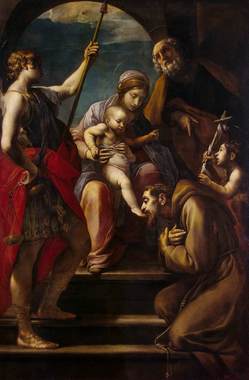
Truly blessed was Mary who possessed both
humility and virginity. And truly wondrous the virginity of those whose fruitfulness is not stained, but adorned her; and truly singular the humility, which this
fruitful virginity has not troubled, but rather exalted; and wholly
incomparable the fruitfulness which goes hand in hand with her humility and her
virginity. Which of these things is not wondrous? Which is not beyond all
comparison? Which that is not wholly singular? It would be strange if you did
not hesitate to decide which you regard as most worthy of praise: whether the
wonder of fruitfulness of offspring in virginity, or of virginal integrity in a
mother: sublimity of Offspring, or humility joined to such dignity: unless it
be that we place both together above each one singly: and it is truly beyond
any doubt more excellent and more joyful to have beheld these perfections
united in her, than to see but one part of them.
And can we wonder that God, of
Whom it is written that He is wonderful in his saints, [Ps. 67: 36] shows
Himself in His own Mother yet more wondrous still. Venerate then, Ye spouses,
this integrity of flesh in our corruptible flesh. Revere likewise, you virgins,
fruitfulness in virginity. Let all men imitate the humility of God’s Mother.
Honor, you angels, the Mother of your King, you who adore the Offspring of our
Virgin; Who is your King and our King, the Healer of our race, the Restorer of
our fatherland: Who among you is so sublime, yet among us was so lowly: to
Whose Majesty as well from you as from us let there be adoration and reverence:
to whose Perfection be there honor and glory and empire for ever and ever.
Amen.
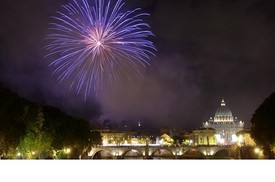 Now is the old year passed away.
Now is the old year passed away.